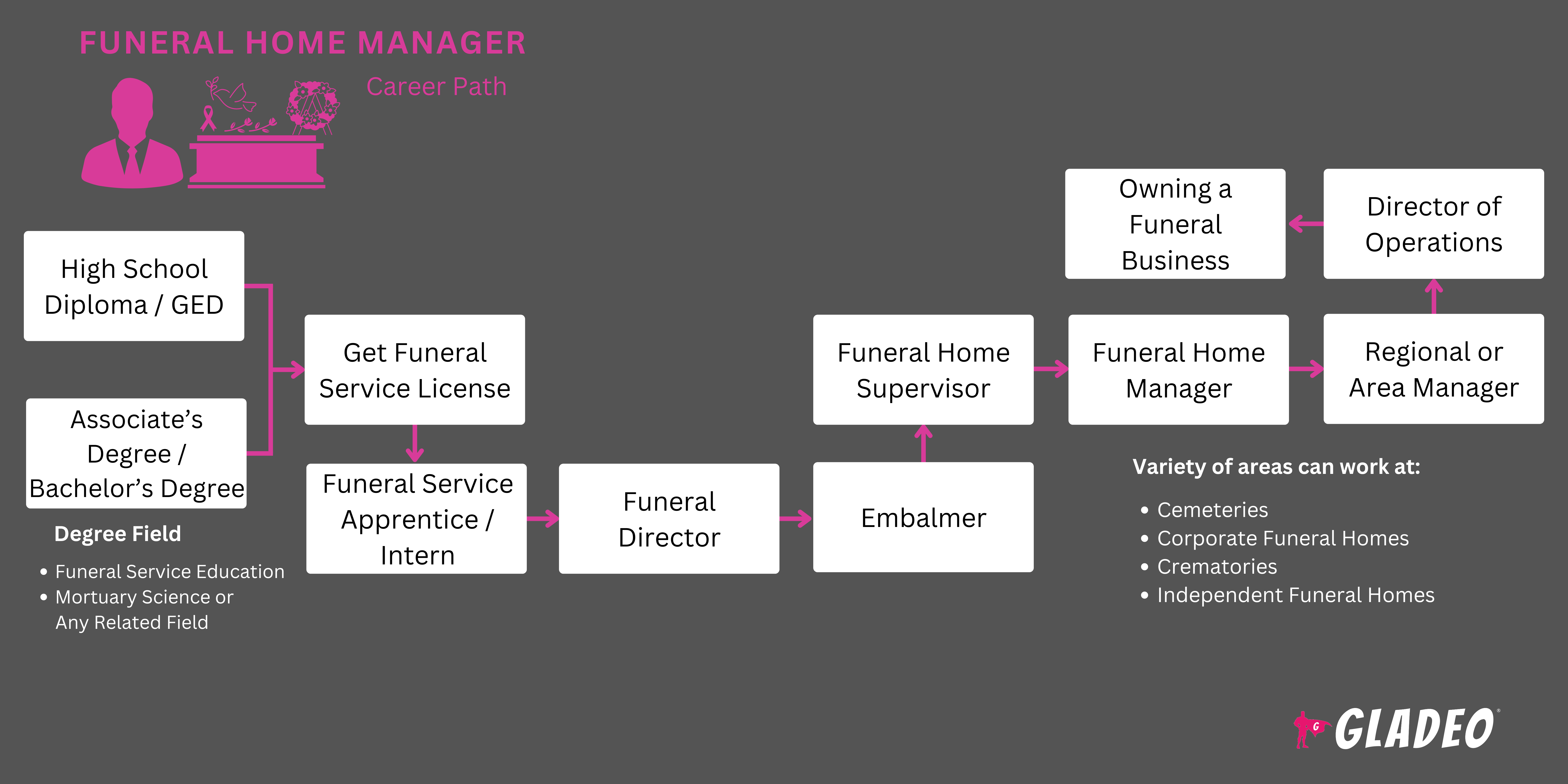Mga spotlight
Funeral Director, Mortician, Undertaker, Funeral Services Manager, Funeral Home Director, Funeral Administrator, Embalmer-Funeral Director, Pre-Need Counselor, Funeral Care Supervisor, Crematory Manager, Funeral Consultant, Funeral Operations Manager
Every family wants to say goodbye to their loved ones with dignity, peace, and respect—but few realize just how much coordination and care goes into making that possible. That’s where Funeral Home Managers come in.
They’re the behind-the-scenes leaders who make sure every detail of a funeral or memorial service goes smoothly—from preparing the venue and scheduling staff to ensuring that flowers, music, and transportation all align perfectly. While funeral directors often work directly with families, Funeral Home Managers oversee the entire operation, balancing compassion with business management.
Think of them as both organizers and caregivers. They supervise funeral home employees, handle budgets, ensure compliance with health and safety laws, and maintain a comforting, professional environment for grieving families. Whether it’s a small private service or a large memorial, Funeral Home Managers keep everything running seamlessly—so families can focus on honoring their loved one, not the logistics.
It’s a career that blends empathy with efficiency, business sense with humanity—and at its heart, it’s about helping people find comfort during life’s hardest moments.
- Helping families find peace and closure during difficult times.
- Providing compassionate service that honors life and tradition.
- Leading a professional team dedicated to community care.
- Managing a business that balances service with sensitivity.
- Seeing the impact of your work reflected in the gratitude of families.
Oras ng trabaho
Funeral Home Managers typically work full-time and are often on call for emergencies that can occur at any hour. They may work evenings, weekends, or holidays, depending on client needs. Some oversee multiple services in a day, requiring careful time management and attention to detail.
Mga Karaniwang Tungkulin
- Supervise funeral directors, embalmers, and support staff.
- Meet with families to discuss service arrangements.
- Prepare and file legal documents such as death certificates.
- Manage finances, budgets, and funeral home operations.
- Coordinate logistics for funerals, cremations, and burials.
- Ensure compliance with all state, local, and health regulations.
- Maintain facilities, vehicles, and equipment.
Mga Karagdagang Pananagutan
- Provide grief support resources to families.
- Develop marketing or community outreach programs.
- Oversee pre-need funeral planning and sales.
- Train and mentor new funeral staff or apprentices.
- Represent the funeral home at community and religious events.
A Funeral Home Manager’s day often begins with reviewing schedules, checking on facilities, and preparing for upcoming services. They might meet with families to finalize arrangements, ensure that all documents are in order, and confirm details with florists, clergy, or cemetery staff.
Throughout the day, they balance compassion and coordination—guiding families through emotional decisions while managing employees and service logistics. During a funeral, the manager ensures that everything runs smoothly and respectfully, often staying discreetly in the background to oversee every detail.
At day’s end, they review records, handle billing, and prepare for the next day’s services. Though the work can be emotionally challenging, it’s deeply fulfilling—knowing you’ve helped families say goodbye with grace and dignity.
Soft Skills
- Compassion and emotional intelligence
- Leadership and staff management
- Professional communication
- Organization and multitasking
- Discretion and confidentiality
- Cultural and religious sensitivity
- Problem-solving and conflict resolution
Teknikal na kasanayan
- Knowledge of funeral law and health regulations
- Business and financial management
- Event planning and coordination
- Customer service and counseling techniques
- Facility and operations oversight
- Use of case management or scheduling software
- General Manager – Oversees all operations, staff, and finances at one or more funeral homes.
- Funeral Director/Manager – Combines direct client service with management duties.
- Crematory Manager – Supervises cremation processes and memorial services.
- Regional Manager – Oversees multiple funeral homes for a corporation or district.
- Owner/Operator – Runs an independent or family-owned funeral business.
- Family-owned funeral homes
- Corporate or multi-location funeral companies
- Cemeteries and memorial parks
- Crematories
- Religious institutions offering funeral services
- Government or military funeral divisions
The work demands professionalism, empathy, and constant readiness. Managers often handle multiple funerals, unexpected calls, and emotional situations in a single day. Balancing compassion with business operations can be stressful, and the hours may be long or unpredictable.
However, few careers offer such a profound opportunity to help others heal, lead a caring team, and uphold traditions that honor the lives of loved ones.
- Personalized Services: Families are requesting themed and unique memorials.
- Green Burials: Eco-friendly options such as biodegradable caskets are growing.
- Technology Use: Online tributes, livestreaming, and virtual planning are now standard.
- Pre-Planning Growth: More families make arrangements ahead of time for peace of mind.
- Diversity & Inclusion: Greater emphasis on serving all cultural and faith traditions respectfully.
Future Funeral Home Managers often showed leadership, empathy, and responsibility. They may have been the ones who organized group activities, helped comfort friends in need, or took part in volunteer or community service projects. Many also enjoyed business, psychology, or event planning—skills that combine perfectly in this profession.
Most Funeral Home Managers begin as Funeral Directors. To qualify, you typically need an associate or bachelor’s degree in Mortuary Science or Funeral Service Education from an accredited program.
Courses cover anatomy, embalming, funeral law, ethics, grief counseling, and business management. After graduation, candidates must pass the National Board Exam and obtain a state license, which often requires completing a 1–3-year apprenticeship.
On-the-Job Training
- Management training during or after a funeral apprenticeship.
- Practical experience in scheduling, budgeting, and staff supervision.
- Ongoing education in safety, counseling, and leadership.
Optional Certifications
- Certified Funeral Service Practitioner (CFSP)
- Certified Crematory Operator (CANA)
- OSHA Health & Safety Compliance Certificate
- Grief Counseling Certification
- Business Management or Leadership Training
- High school students can prepare by taking classes in business, accounting, psychology, public speaking, and English composition.
- Participate in school or community activities where you can practice leadership, teamwork, and empathy—such as student council, volunteer clubs, or peer counseling.
- Explore courses in biology or health sciences to understand anatomy and health regulations, which are often part of funeral service programs.
- Volunteer at hospitals, nursing homes, hospices, or community centers to build compassion and comfort around helping others.
- Look for opportunities to shadow a local funeral director or manager to learn what the profession involves day-to-day.
- Check out online articles or videos about Funeral Home Management and funeral service careers to see if the field fits your personality and interests.
- Decide whether you want to pursue an associate or bachelor’s degree in Mortuary Science, Business Administration, or Funeral Service Education.
- Develop organization and time management skills through part-time work, internships, or school projects.
- Keep a professional contact list of mentors, teachers, or supervisors who might later serve as job references.
- Practice a calm, respectful, and professional demeanor—essential traits for working with grieving families.
- Accreditation by the American Board of Funeral Service Education (ABFSE).
- Business and leadership courses in addition to mortuary science.
- Hands-on internships at funeral homes or mortuaries.
- Instructors with professional field experience.
- Career placement or mentorship programs.
Sample Programs:
- Worsham College of Mortuary Science
- Gupton-Jones College of Funeral Service
- Cincinnati College of Mortuary Science
- American Academy McAllister Institute of Funeral Service
- San Antonio College – Mortuary Science Program

- Search listings on NFDA.org, FuneralJobs.com, Indeed, or LinkedIn for entry-level openings.
- Apply for apprenticeships, assistant manager, or office coordinator positions in local funeral homes.
- Highlight both compassion and leadership experience on your résumé—employers value emotional maturity and organization.
- Gain business and administrative experience through customer-facing roles in hospitality, healthcare, or management.
- Network through professional organizations and local funeral associations to meet mentors and learn about job openings.
- Keep all licenses and certifications current and ensure your credentials meet state requirements.
- Be prepared to discuss how you handle stress, emotion, and multitasking during interviews—these are key parts of the job.
- Maintain a calm, professional appearance and demeanor, even in emotionally charged situations.
- Request letters of recommendation from professors, mentors, or previous employers who can speak to your professionalism.
- Consider starting as a Funeral Service Assistant or Arrangement Counselor to gain firsthand experience.
- Attend career fairs, mortuary science events, and workshops to meet potential employers.
- Stay open to relocation or flexible scheduling, especially early in your career, to increase job opportunities.
- Earn a bachelor’s or master’s degree in Business Management, Funeral Service Administration, or a related field.
- Obtain certifications in grief counseling, cremation management, or OSHA safety to expand your expertise and credibility.
- Take on supervisory duties or manage multiple funeral home locations to build leadership experience.
- Attend leadership seminars, business workshops, and funeral service conventions to stay current with industry trends.
- Join professional associations like the National Funeral Directors Association (NFDA) or the Academy of Professional Funeral Service Practice (APFSP).
- Learn about marketing, customer service, and community relations to strengthen your business reputation.
- Network with suppliers, florists, clergy, and local officials to form strong professional partnerships.
- Develop mentoring skills by training new funeral home employees and supporting apprentices.
- Explore opportunities to specialize in green burials, memorial planning, or cultural funeral practices.
- Eventually, open or manage your own funeral home to become a trusted name in your community.
Mga website
- NFDA.org (National Funeral Directors Association)
- ABFSE.org (Accrediting Body for Mortuary Science)
- FuneralServiceFoundation.org
- CANA.org (Cremation Association of North America)
- FuneralJobs.com
- CareerOneStop.org
- O*NET OnLine
- TheGoodFuneralGuide.com
- ICCFA.com (International Cemetery, Cremation & Funeral Association)
- MortuaryScienceCareers.com
- FuneralResources.com
- FuneralTimes.com
- Embalmers.org (Professional association for embalmers and funeral directors)
- FuneralConsumers.org (Funeral Consumers Alliance)
- ThanatologyAssociation.org (Association for Death Education and Counseling)
Mga libro
- The Funeral: A Chance to Touch, A Chance to Serve by Thomas Lynch
- Grave Matters by Mark Harris
- Rest in Peace: Insider’s Tips for the Afterlife Industry by R. L. Swenson
Funeral Home Managers play a vital role in their communities—leading teams that help families through loss with compassion and professionalism. It’s not just a career in service; it’s a career in leadership and humanity.
If you’re drawn to meaningful work that blends business with heart, you might also consider:
- Grief Counselor
- Social Worker
- Clergy or Chaplain
- Tagaplano ng Kaganapan
- Cemetery or Memorial Park Manager
- Human Resources Manager
- Hospitality or Customer Service Director
- Nonprofit Program Coordinator
Newsfeed

Mga Tampok na Trabaho

Mga Online na Kurso at Tool







